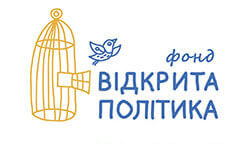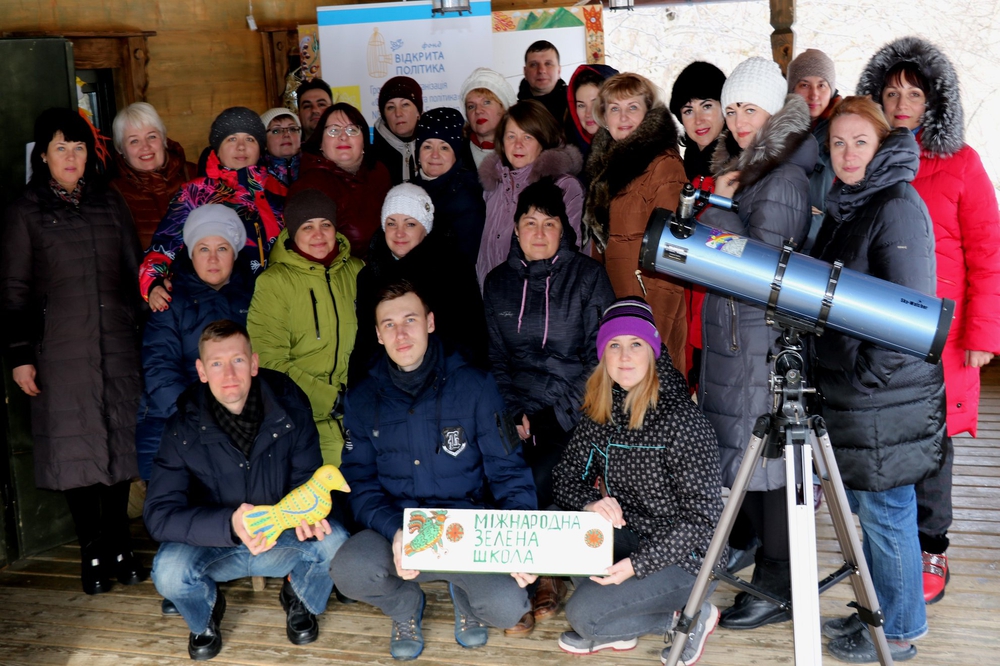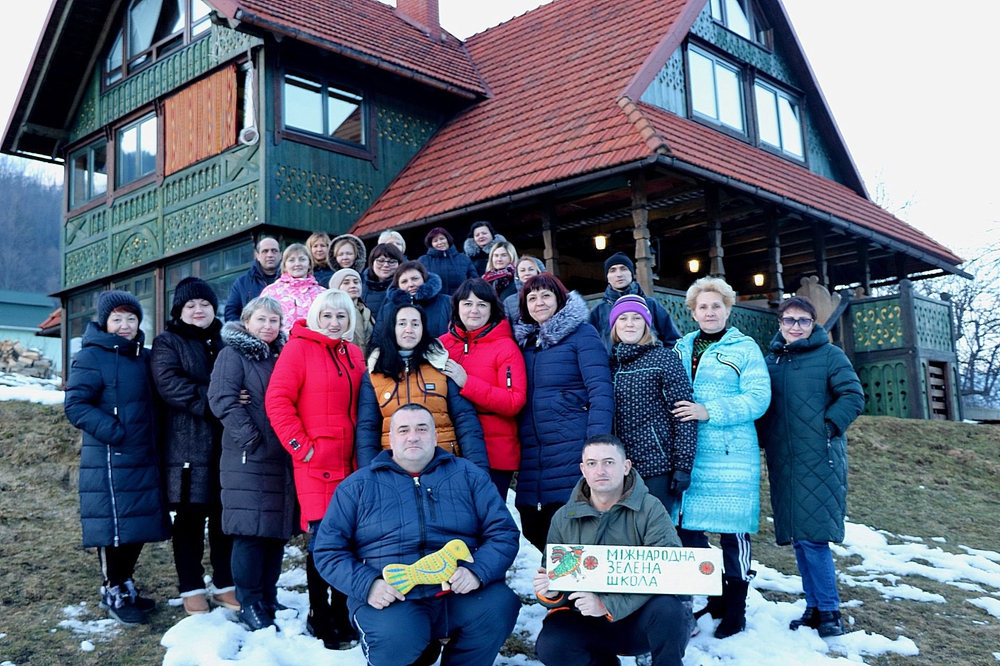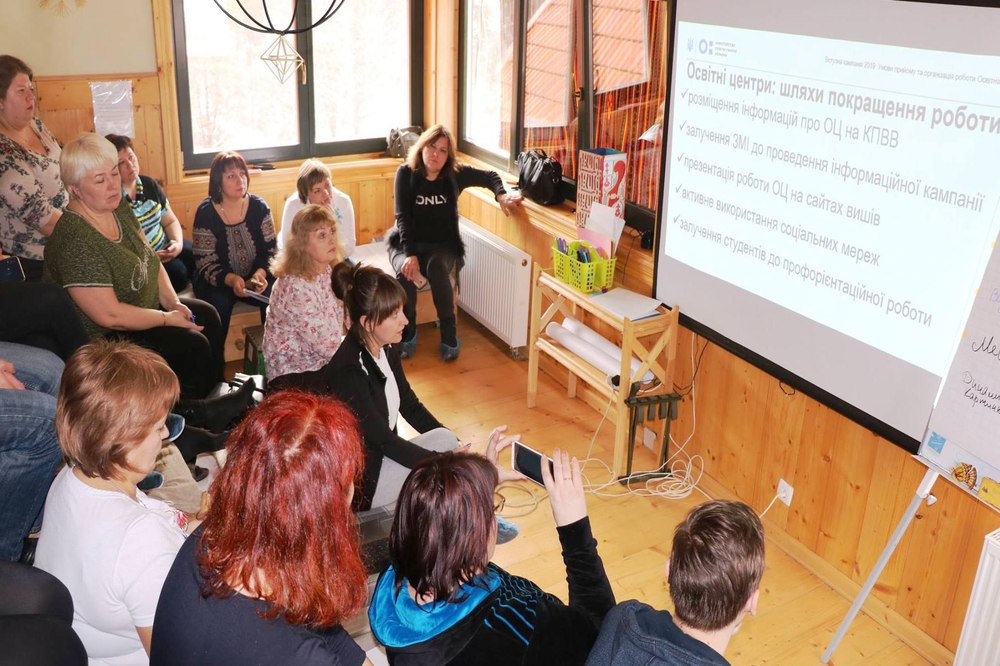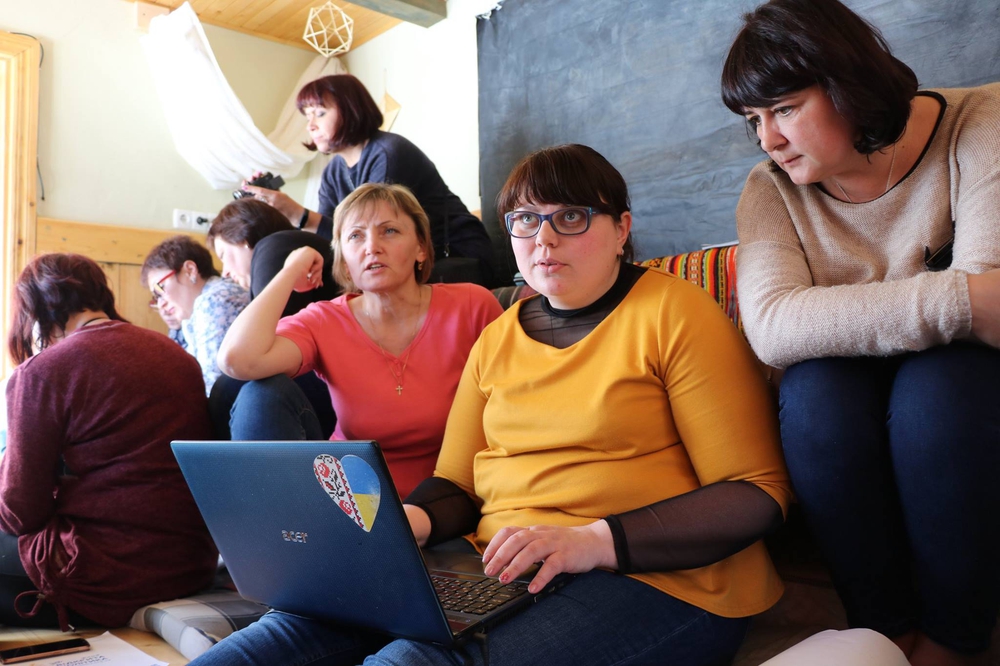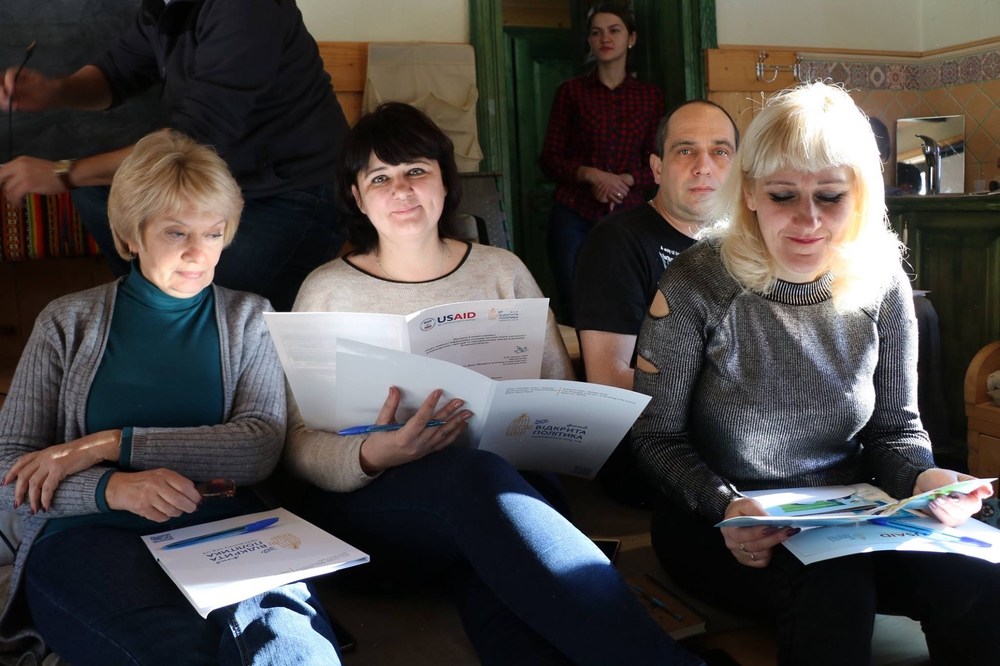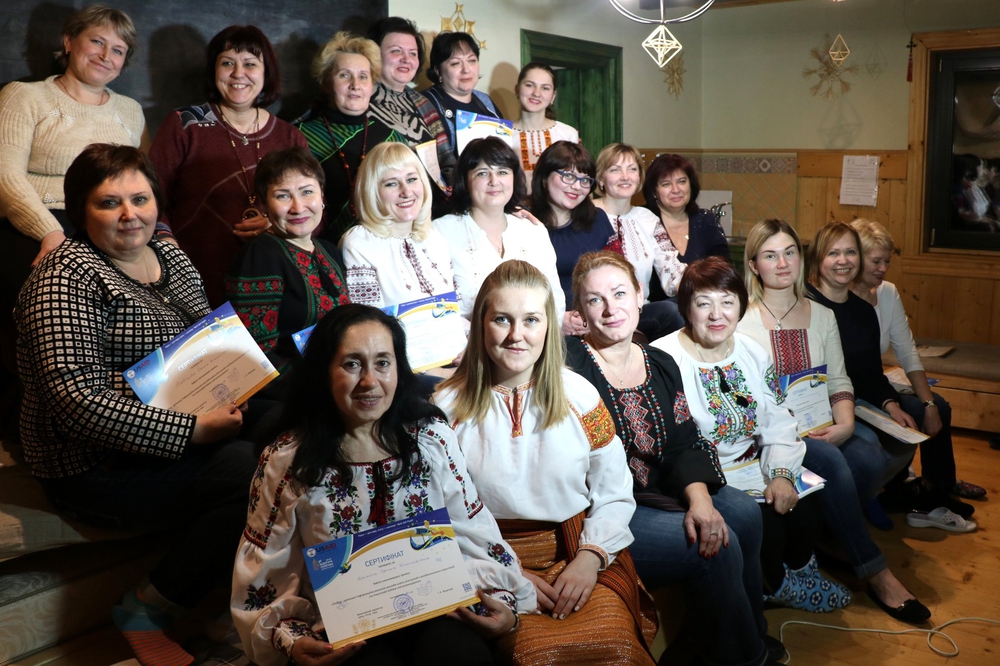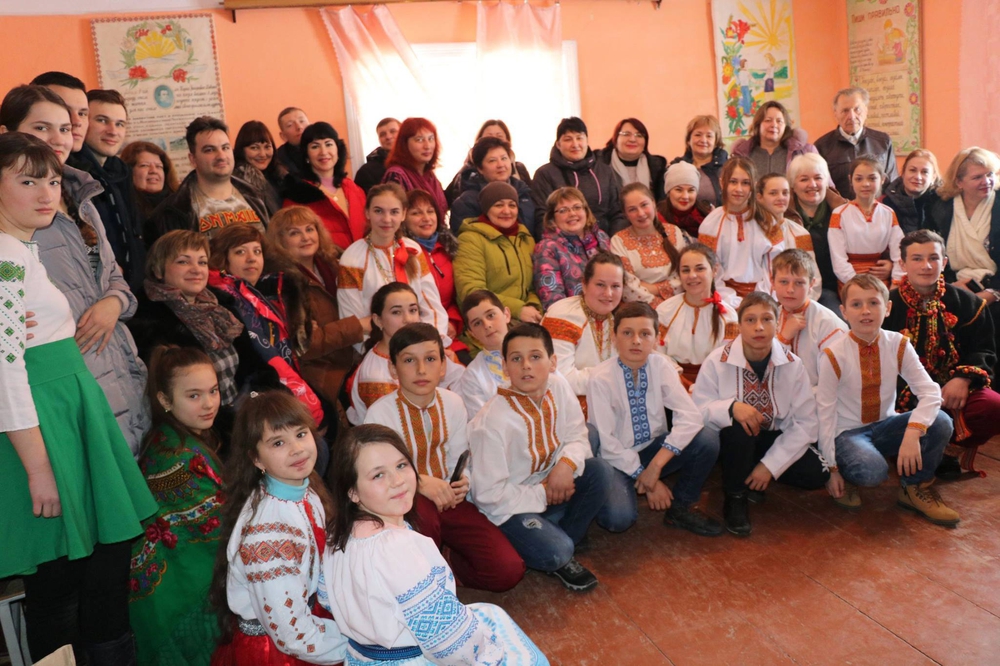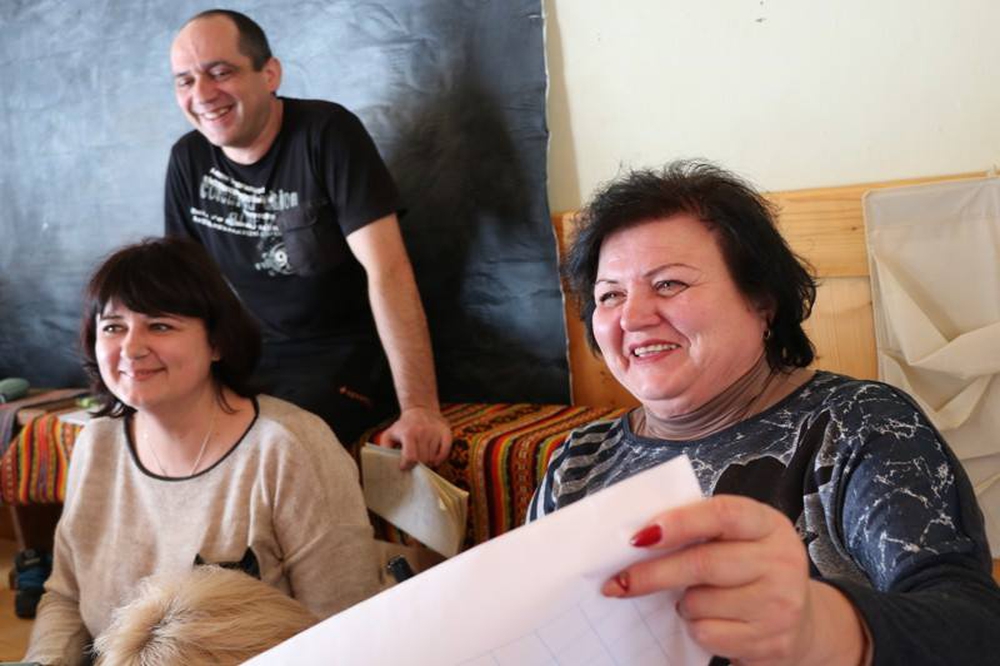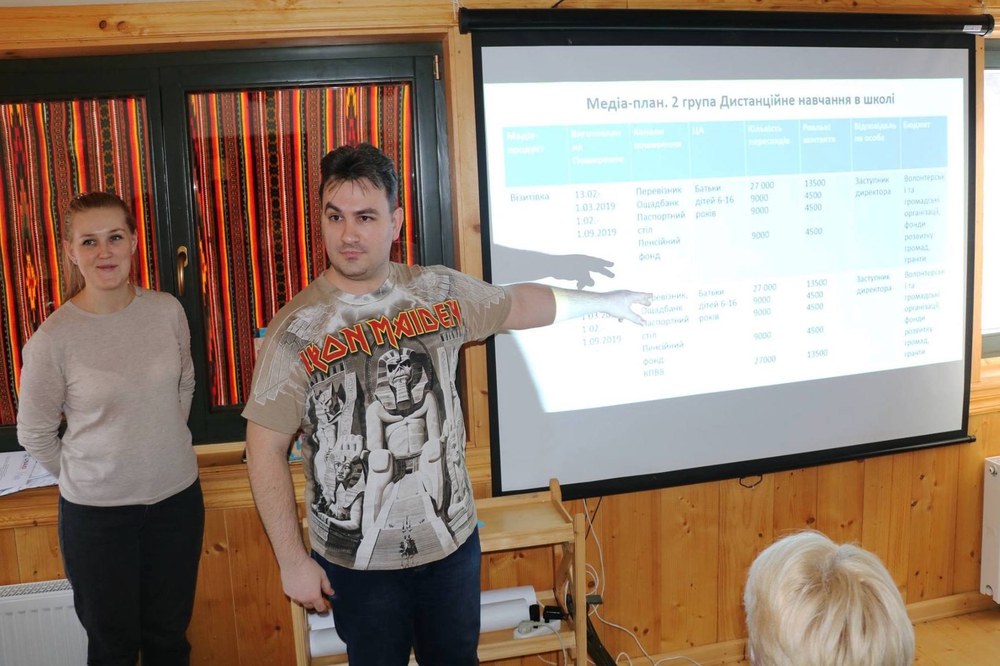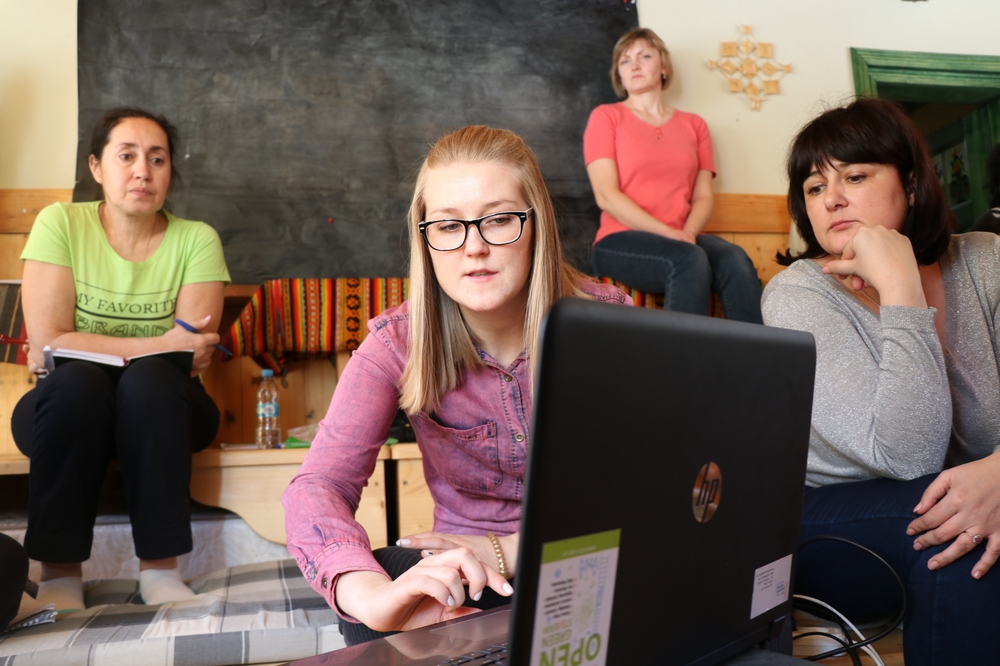News
“Training sessions paved the green way, where to go and how to work ...”
Feb. 26, 2019, 10:59 a.m.The NGO “Open Policy Foundation” has trained educators who work with residents of non-government controlled areas of Ukraine.
Representatives of an educational branch from Luhansk and Donetsk oblasts participated in the Open Policy Foundation’s training “An information campaign of educational institutions for youth from non-government controlled areas of Ukraine and territories along the contact line.”
The training sessions were held from February 6 to February 10 and from February 12 to February 16 at the International Green School named after Klim Churyumov in the village of Kosmach, Ivano-Frankivsk Oblast. The Foundation organized two webinars on “Distant education for schoolchildren from non-government controlled areas of Ukraine and territories along the contact line” in cooperation with the Ministry of Education and Science of Ukraine.
Among participants, there were 46 representatives of the educational branch of Donetsk and Luhansk oblasts from schools, universities, colleges, education departments, the Institute of Postgraduate Pedagogical Education, and the “Donbas-Ukraine” Educational Centers. Educators came from different cities and villages, namely Sieverodonetsk, Starobilsk, Rubizhne, Kreminna, Lisichansk, Girske, Troitske, Novoohtyrka, Novopskovsk, Kramatorsk, Slavyansk, Bakhmut, Mariupol, Toretsk, Mirnohrad, Pokrovsk, Dobropillya, Volnovakha, and Illinivka.
“The training will help to adjust the work on the admission campaign ...”
The training program included training sessions on developing a communication strategy for educators. The participants learned to develop media plans for schools, education centers, district/regional education departments; they got to know about the criteria for social advertising, the procedure of obtaining the social advertisements status, and channels of its dissemination. They also practically mastered the types of media products, the general requirements for their creation, and the peculiarities of media product layouts (posting in social networks, motivational postcards, and poster) using the Canva application. In addition, the trainers introduced the peculiarities of the education telephone hotline on the basis of educational institutions and departments of education. They also received the basic information on project management complemented by the experience of NGO “Open Policy Foundation.”
In the end, the training participants successfully presented the results of group work on the project information campaign and media plan for three sectors: 1) schools provided distance education, 2) the Educational Center, 3) the education department. On the following day, they used the Canva graphical application to develop a concept and a layout based on the media plan. Familiarity with this online service gave a new experience that had practical benefits.
“I was really pleased that they taught us to work with the Canva application. Upon arriving at school, we plan to publish posters on a website that could interest children from a non-government controlled area. Our school helps such schoolchildren acquire state-issued documents so that they can continue their studies at Ukrainian universities,” said Larysa PISKOVA, Deputy Director of Educational Institution of the I-III levels № 8 of Rubizhne, Luhansk Oblast.
“We shared experiences in our group,” noted Lyudmila PESTRETSOVA, Deputy Director of the Slavyansk Chemical and Mechanical Technical School and Head of the “Donbas-Ukraine” Educational Center in Slavyansk. “Some participants worked in one direction, others worked towards the other, and together we have already created a media plan that was presented. The Canva program is really useful for our work, and we can use it later.”
In addition, the participants learned to identify key messages for the information campaign considering specifics of communication with schoolchildren and students from non-government controlled areas of Ukraine. While working in groups, the participants thought about information messages for their target audience and developed design of media products, namely an interactive posting of the Education Center for the Facebook social network, a motivational card for the school, and a poster for the education department.
“It was clear that the materials we produced earlier were not quite correct, and the population could not perceive them as we wanted it to be,” said Natalya MATSAY, Head of the Educational Center at the displaced Luhansk Taras Shevchenko National University, Starobilsk, Luhansk Oblast. “During the training, I also heard a lot of interesting about peculiarities of the telephone hotline work. I hope I will come here again, to Kosmach, to the International Green School. I am interested in the peculiarities of the STrEAM education that is practiced here. Please take trainees who entered the education institution using the Education Centers but never left Luhansk Oblast.”
“The training will help me adjust my work for the next admission campaign,” said Yuliia NEFYODOVA, Executive Secretary of the Admission Committee at the displaced Luhansk National Agrarian University, Kharkiv. “I was criticized a bit, but it was a constructive critique, and I will now be able to use this program more professionally to create media products for young people from non-government controlled areas.”
“During the practical task, we thought over the website improvement, where exactly to place the information about the external studies so that no one had to search it in different sections and pages of the website,” noted Tetyana TILININA, Director of the Mariupol Secondary School №54 of Donetsk Oblast.
"We highlighted the importance of all region education representatives’ synergy ...”
Educators from different spheres (district education departments, schools, colleges, universities, regional institutes of postgraduate pedagogical education, the Education Centers, and the Ministry of Education and Science) worked together during sessions. Those activities contributed to the establishment of interaction in their further work in the region, which almost all training participants emphasized. During breaks, they were able to openly discuss issues of cooperation between representatives of schools, education centers, education departments and MoES. The training became a real synergy platform for expanding relationships and harmonizing approaches to identifying needs, communication strategies and activities during an information campaign.
Participants shared their ideas during the final conferences “From the ecology of values – to the ecology of information space.” In particular, it was the idea to use Skype to establish a link between schoolchildren from a village school in Kosmach and schools in the East of the country, to conduct an internship for students from non-government controlled areas who studied at the “Donbas-Ukraine” Education Centers.
“Our meeting paved the green way, where to go and how to work,” emphasized Natalia BOBROVSKA, Deputy Head of the Education Department at the Dobropil City Council of Donetsk Oblast. “We understood that it was necessary to cooperate with the Education Centers. Children who do not have documents request us, and many questions arise. Children should not be abandoned. I hope that the issues will be resolved after the training; because not everything is written and clear in the law. Let's hope that cooperation will give us the result.”
“We have developed a universal media plan for the “Donbas-Ukraine” Education Centers at the admission campaign 2019,” Vyacheslav KUDLAI, Head of the “Donbas-Ukraine” Education Center from Mariupol, Donetsk region, shared the results of group work. “We learned a lot of new tools for attracting potential entrants from the non-government controlled area of Donbas, and we rethought ways of working. We are grateful to the organizers who have shown the importance of synergy of all the educator’s forces in our region. I am sure that new acquaintances with colleagues from the education centers, schools and education departments will contribute to the children from non-government controlled areas.”
“We have got answers to many questions during the webinar ...”
An important element of the training was 2 webinars “Distance education for schoolchildren from non-government controlled areas of Ukraine and territories along the contact line.” They were held at the International Green School together with the Department of General Secondary and Preschool Education of the Ministry of Education and Science of Ukraine, in particular with the participation of Olga MALYSHEVA, who was responsible for this direction. Modern technology and fiber optic Internet at the International Green School already allows studying today without frontiers even high in mountains.
During the webinar, all the training participants and their field colleagues in the region (33 participants of talk via Skype) could voice issues specific to their region and have advice on the peculiarities of recognizing documents of children from non-government controlled areas.
Representatives of the Ministry of Education and Science, Acting Director of the Department of Higher Education Svitlana KRETOVYCH and Chief Specialist of the Sector for Displaced Higher Educational Institutions Iryna KRAVCHUK also visited the training on February 15. For one and a half hour meeting with the educators from Donetsk region, the MoES representatives had to cover the distance twice as long. The conversation was extremely productive. The training participants were able to get clarifications on the working procedure of the “Donbas-Ukraine” Education Centers in 2019, ask questions personally, and clarify nuances of educational documents. Then the conversation became informal on the gallery of the International Green School.
“I would like to emphasize the importance of such informal meetings on the basis of the International Green School organized with colleagues from the “Donbas-Ukraine” Education Centers and schools providing distance learning,” said Yuriy DYACHENKO, Head of the “Donbas-Ukraine” Education Center in Kramatorsk of Donetsk Oblast. “Each of us faces non-standard situations in the process of work. Solving such situations requires an individual approach and advice from professionals. Therefore, there is an urgent need to conduct such meetings before the admission campaign (May-June) and after it (October-November). The participation of a competent representative from MoES is obligatory! This time, two-hour dialogue with Svitlana Kretovych from MoES resolved all the painful issues.”
“It was interesting to speak about changes in education with a friend from Kosmach ...”
The visit to a local school, the Kosmach-Stavnytska Secondary School of I-II levels, evoked special feelings. The training participants saw how the village school works high in the mountains. Local schoolchildren prepared a concert program, and teachers from the East and West of Ukraine were able to discuss common problems in an informal atmosphere and exchange experiences and ideas on how to solve them. A conversation with the young director of the school about the reality of funding caused them many thoughts. They noted that rural schools had better support and conditions for education. And they especially liked the unique family atmosphere in the Kosmach-Stavnytska school.
“It was interesting to talk about changes in education with a kolizhanka (a girl-friend) from Kosmach,” noted Svitlana BURDUN, Director of an Illinivka school of Donetsk Oblast. “There was an exchange of experience: how they cope with all things in the village school.”
“I was impressed by a sincere reception; we were greeted with songs and warmth of souls! We saw how they learn and conditions. It takes one and half hours for some students to get the school, but this do not affect their education! They have the same textbooks and curricula,” Vira DOROKHOVA, Deputy Director of Rubizhne school № 8 of Luhansk Oblast, shares her impressions. “They do not differ anything from us.”
In addition to the information campaign sessions, the training envisaged measures to form a team, psychological and social rehabilitation, confidence building, and overcoming stereotypes among educators from different regions. During the afternoon “hour for dreams,” the participants managed to enjoy nature, the short-term warmth of the mountain sun and the color of local life. The incredible beauty of the high-mountain village Kosmach, which is known throughout the world by the preserved Ukrainian traditions, inspired the participants. Many of them were in the mountains for the first time. Mobility is an important driver of the capacity building for teachers.
An additional feature of the training at the International Green School was an atmosphere that created a cordial relationship between, this time, the educators of Luhansk, Donetsk and Ivano-Frankivsk oblasts. The development of contacts between people from different regions built bridges of peace and removed stereotypes. Therefore, the participants, together with the teachers of the Kosmach local schools, also danced with musicians on the IGS gallery, modeled konyky (little figures of horses made of cheese), sang near a stove, ate Hutsul dishes directly from the stove, debated with scented cardamon coffee surrounded by waterfall noise, and had fun dancing around the fire. In the morning, they filled with positive energy during exercises. Late in the evening, they dreamed while observing the Carpathian sky in a telescope. A film about the world-famous Ukrainian scientist Klim Churyumov, the International Green School named after, helped the participants to broaden the horizons about the Universe and space achievements of Ukraine.
“It is a revolution in the head. Indeed, all things are known by comparison,” noted Valentyn RUDYK, Acting Director of the Pokrovsk school № 9 of Donetsk Oblast. “We saw a school here and started appreciating what we had. It is harder for teachers; children do not have good nutrition at school. And the children here have a harder path to a better education than we have ... When traveling, we face a different way of life and traditions, we meet interesting people. Then there really is rethinking of values and “reboot” of the brain. Next, we can take new steps, think creatively and implement ideas.”
“You feel professionalism while working with the Open Policy Foundation,” said Yuliia NEFYODOVA, Executive Secretary of the Admissions Committee at the Luhansk National Agrarian University, moved to Kharkiv. “Our awareness about information campaigns is growing in a natural atmosphere of tolerance and competence. Such an amazing combination inspires not only the creation of new products for entrants from the non-government controlled areas but also the desire to develop ourselves in the future.”
This training was organized by NGO “Open Policy Foundation” in cooperation with the Ministry of Education and Science of Ukraine, regional education departments in Luhansk and Donetsk oblasts, and it is carried out in the framework of the Ukraine Confidence Building Initiative II (UCBI II) project funded by the United States Agency for International Development (USAID).

